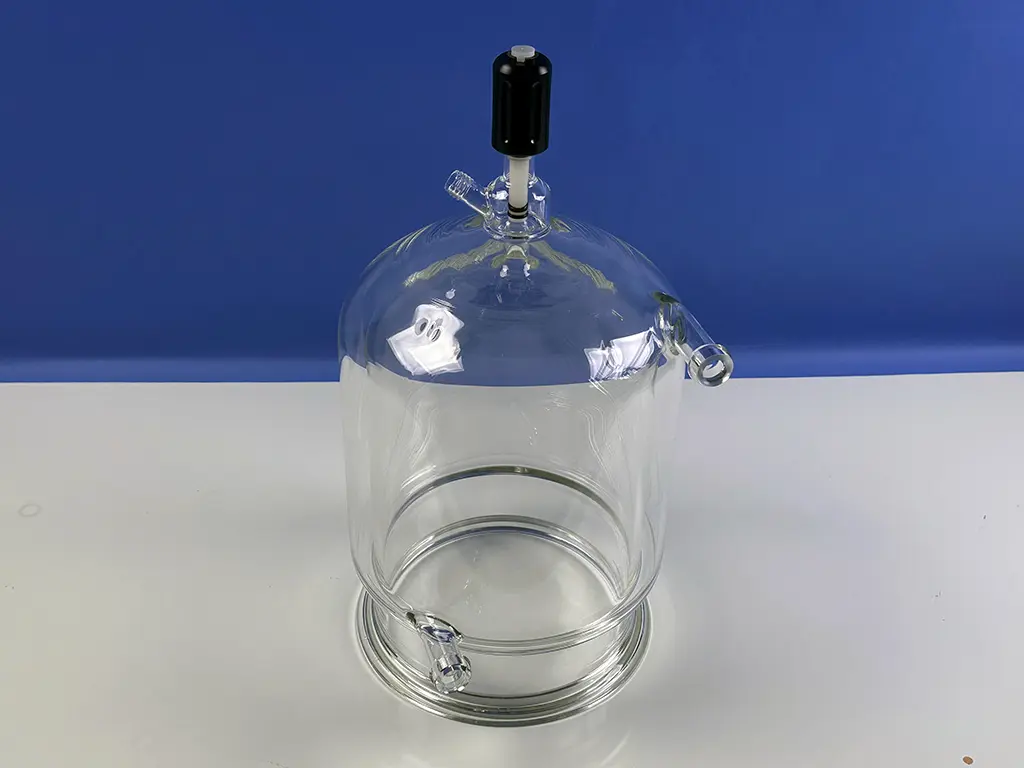Custom labware often fills a specific need when standard, off-the-shelf glassware is unavailable or unsuitable. Such was the case with this recent custom glass reactor, a design from borosilicate glass by Precision Glassblowing in Colorado. Unable to make accommodations with standard reactors, the frustrated lab was referred to PGB recently. In the end, it was the perfect solution.
“They had a different reactor that didn’t have the qualities they were looking for,” says Precision Glassblowing CEO Ron Bihler, “so we worked with them to design and replace it with one that better suits their needs.”
That is the beauty of all forms of custom glass because the materials themselves are at once malleable, resistant, recycleable, transparent, and made of materials we have in abundance in nature; therefore, sustainable. Glass materials are generally available in plentitude and will take the form of whatever engineering and the glassblower requires. In addition, glass is an amorphous solid, meaning it has a molecular structure between a solid and a liquid. Finally, glass is one of the oldest and most versatile materials created by humans.

What is the purpose of a custom labware glass reactor?
Wherever you find applications process development, pharmaceutical research, chemical production, and material science, you will find glass reactors hard at work. In fact, they are important tools in industries that require chemical synthesis, crystallization, and distillation.
Chemical Applications
- Synthesis: Making chemicals for the pharmaceutical and chemical industries
- Polymerization: Making resins, adhesives, and plastics
- Reaction kinetics: Studying reaction rates
- Multi-step reactions: Performing multiple steps in a process

Pharmaceutical Applications
- Research and development: Developing new drugs and other pharmaceutical products
- Production: Manufacturing pharmaceutical products
Other Applications
- Crystallization: Growing chemical compounds into crystals
- Extraction: Isolating natural products and purifying chemicals
- Distillation: Separating solvents and recovering chemicals
- Botanical extraction: Isolating plant materials
- Food and industrial processes: Used in a variety of food and industrial processes

What are the benefits and drawbacks of glass reactors?
There are many benefits to using glass reactors. Some of them include:
- Chemical resistance: Glass reactors are inert and don’t react with many chemicals
- Real-time adjustment: You can easily adjust and tune processes
- Observation: Glass reactors allow for easy observation of reactions
Of course, there are a few drawbacks as well, such as:
- Temperature and pressure limitations: Depending on the type, glass reactors may not be suitable for high temperatures or pressures
- Chemical damage: Harsh chemicals can damage glass, even with protective coatings

What are the types of glass, and what can they withstand?
The highest temperature glass can withstand depends on the type of glass and how it’s made.
- Standard window glass: Shatters at around 250°F
- Tempered glass: Can withstand temperatures up to around 500°F
- Fire-rated glass: Can withstand temperatures over 1600°F
- Heat-resistant glass: Can retain its shape at temperatures up to around 932°F
- Heat-resistant glass-ceramic: Can withstand temperatures up to around 1800°F
- Ceramic glass: Can withstand temperatures up to around 1832°F
- Borosilicate glass: Can withstand temperatures up to around 959°F
- Quartz Glass: Can withstand temperatures up to around 2190°F

Factors affecting glass’s temperature tolerance:
- Thermal shock: Rapid changes in temperature can cause glass to break
- Composition: The composition of the glass affects its melting point
- Glass type: Different types of glass have different temperature tolerances

Winning with Non-Standard Solutions
Custom labware is a valuable tool for scientists and researchers. For example, it can improve performance, increase flexibility, reduce the risk of contamination, increase durability, and improve aesthetic appeal. When choosing this option, it is important to consider the specific needs of the application and the available options.
From the day Precision Glassblowing’s founders threw open the doors in 1982, they dreamed of growing into more than a simple glass shop. They shared a vision to become a full-service glass company capable of handling any job involving scientific glassware.
As a result, much of PGB’s history has been about the manufacture and development of ICP and the ICP-MS industry, working closely with leaders like Thermo, Agilent, and Spectro. Over the years, the company has grown far beyond those dreams with capabilities in machining (grinding, polishing, laser cutting, etc.), coiling, and even in optical glass. To learn more about Precision Glassblowing, check out our shop of more than 1,800 products.